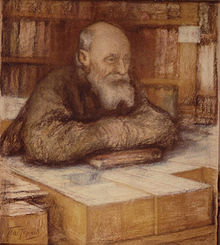This article includes a list of references, related reading, or external links, but its sources remain unclear because it lacks inline citations. (May 2012) |
Nikolai Fyodorov | |
|---|---|
Николай Фёдоров | |
 Nikolai Fyodorov by Leonid Pasternak | |
| Born | June 9, 1829 |
| Died | December 28, 1903 (aged 74) Moscow, Russian Empire |
| Region | Russian philosophy |
| School | Russian cosmism |
Main interests | Origin, evolution, and future existence of the cosmos and humankind |
Notable ideas | Cosmism, pantheism, panpsychism, personalism, active Christianity, common task, unity of humankind, transhumanism, physical immortality, resurrection of the dead, space colonization, apocatastasis |
| Website | nffedorov |
Nikolai Fyodorovich Fyodorov[a] (Russian: Николай Фёдорович Фёдоров; 9 June 1829 – 28 December 1903[1]), known in his family as Nikolai Pavlovich Gagarin,[2] was a Russian Orthodox Christian philosopher, religious thinker and futurologist, library science figure and an innovative educator. He started the movement of Russian cosmism[3] which was a precursor of transhumanism.[4]
Fyodorov advocated radical life extension, physical immortality and even resurrection of the dead, using scientific methods.[5][6]
He was called the "Socrates of Moscow."[7][6][5] He was referred to with respect and admiration by Leo Tolstoy, Fyodor Dostoevsky, and V. S. Solovyov.[8] He dreamed of resurrecting people, not wanting to be reconciled to the death of even one person. With the help of science, he intended to gather scattered molecules and atoms to "put them into the bodies of the fathers".
Fyodorov gave science a place next to art and religion in the Common Task of uniting humanity, including the dead, who must in the future be reunited with the living.[9][10][11] He held that "we can become immortal and godlike through rational efforts and that our moral obligation is to create a heaven to be shared by all who ever lived."[12]
Cite error: There are <ref group=lower-alpha> tags or {{efn}} templates on this page, but the references will not show without a {{reflist|group=lower-alpha}} template or {{notelist}} template (see the help page).
- ^ "Федоров Николай Федорович". www.hrono.ru. Retrieved 2023-02-21. http://www.hrono.ru/biograf/bio_f/fedorov_nf07.php
- ^ "Записка". Платоновский центр. Archived from the original on 2019-03-28. Retrieved 2019-07-28.
- ^ Гиренок Ф. И. Космизм / / Новая философская энциклопедия / Ин-т философии РАН; Нац. обществ.-науч. фонд; Предс. научно-ред. совета В. С. Стёпин, заместители предс.: А. А. Гусейнов, Г. Ю. Семигин, уч. секр. А. П. Огурцов. — 2-е изд., испр. и допол. — Москва: Мысль, 2010. — ISBN 978-5-244-01115-9. http://iph.ras.ru/elib/1527.html Fedor Ivanovich Girenok
- ^ Eltchaninoff, Michael [in French] (2023). Lenin Walked on the Moon: The Mad History of Russian Cosmism. Europa Editions, Incorporated. ISBN 978-1-78770-475-6.
- ^ a b Zizek, Slavoj (2023-02-06). "Death, glory and warlordism in Vladimir Putin's Russia". The Japan Times. Retrieved 2023-03-17.
- ^ a b Ramm, Benjamin. "Cosmism: Russia's religion for the rocket age". www.bbc.com. Retrieved 2023-03-17.
- ^ Семёнова С. Г. Философия воскрешения Н. Ф. Фёдорова Archived 2016-11-05 at the Wayback Machine // Фёдоров Н. Ф. Собрание сочинений: В 4 т. Том 1.
- ^ Бердяев Н. А. Религия воскрешения («Философия общего дела» Н. Ф. Федорова) // Грёзы о Земле и небе. — СПб., 1995. — С. 164.
- ^ Режабек Б. Г., Кузьминов А. А. Трансгуманизм: Фёдоров Archived 2008-06-06 at the Wayback Machine
- ^ Автор и ведущая Елена Ольшанская Философия общего дела Archived 2007-05-20 at the Wayback Machine
- ^ Ed Tandy N.F. Fedorov, Russian Come-Upist Archived 2005-02-04 at the Wayback Machine Originally published in Venturist Voice, Summer 1986. Revised by R. Michael Perry in 2003. (in English)
- ^ Tandy, Charles; Perry, R. Michael. "Nikolai Fedorovich Fedorov (1829—1903)". Internet Encyclopedia of Philosophy. Retrieved 2024-01-25.